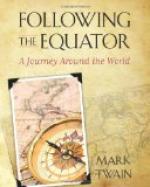The great bulk of the savages must go. The white man wants their lands, and all must go excepting such percentage of them as he will need to do his work for him upon terms to be determined by himself. Since history has removed the element of guesswork from this matter and made it certainty, the humanest way of diminishing the black population should be adopted, not the old cruel ways of the past. Mr. Rhodes and his gang have been following the old ways.—They are chartered to rob and slay, and they lawfully do it, but not in a compassionate and Christian spirit. They rob the Mashonas and the Matabeles of a portion of their territories in the hallowed old style of “purchase!” for a song, and then they force a quarrel and take the rest by the strong hand. They rob the natives of their cattle under the pretext that all the cattle in the country belonged to the king whom they have tricked and assassinated. They issue “regulations” requiring the incensed and harassed natives to work for the white settlers, and neglect their own affairs to do it. This is slavery, and is several times worse than was the American slavery which used to pain England so much; for when this Rhodesian slave is sick, super-annuated, or otherwise disabled, he must support himself or starve—his master is under no obligation to support him.
The reduction of the population by Rhodesian methods to the desired limit is a return to the old-time slow-misery and lingering-death system of a discredited time and a crude “civilization.” We humanely reduce an overplus of dogs by swift chloroform; the Boer humanely reduced an overplus of blacks by swift suffocation; the nameless but right-hearted Australian pioneer humanely reduced his overplus of aboriginal neighbors by a sweetened swift death concealed in a poisoned pudding. All these are admirable, and worthy of praise; you and I would rather suffer either of these deaths thirty times over in thirty successive days than linger out one of the Rhodesian twenty-year deaths, with its daily burden of insult, humiliation, and forced labor for a man whose entire race the victim hates. Rhodesia is a happy name for that land of piracy and pillage, and puts the right stain upon it.
Several long journeys—gave us experience of the Cape Colony railways; easy-riding, fine cars; all the conveniences; thorough cleanliness; comfortable beds furnished for the night trains. It was in the first days of June, and winter; the daytime was pleasant, the nighttime nice and cold. Spinning along all day in the cars it was ecstasy to breathe the bracing air and gaze out over the vast brown solitudes of the velvet plains, soft and lovely near by, still softer and lovelier further away, softest and loveliest of all in the remote distances, where dim island-hills seemed afloat, as in a sea—a sea made of dream-stuff and flushed with colors faint and rich; and dear me, the depth of the sky, and the beauty of the strange new cloud-forms, and the glory of the sunshine, the lavishness, the wastefulness of it! The vigor and freshness and inspiration of the air and the sunwell, it was all just as Olive Schreiner had made it in her books.




